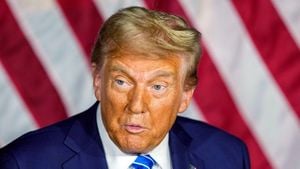Amid growing speculation about the next Chief Minister of Maharashtra, pivotal discussions unfolded today between BJP leader Devendra Fadnavis and the state’s caretaker Chief Minister, Eknath Shinde. Meeting at Shinde’s residence in Mumbai, the two political figures aimed to solidify the power-sharing arrangement within the ruling Mahayuti coalition, which includes the BJP, Shiv Sena, and the Nationalist Congress Party (NCP).
The focus was primarily on devising an effective government formation plan following the coalition's noteworthy success in the recent Maharashtra assembly elections. Fadnavis, who had aspired for the Chief Ministerial role even before the elections, expressed his eagerness to finalize the negotiations for the cabinet.
Shinde has consistently advocated for backing whichever candidate Prime Minister Narendra Modi endorses. Even though he is one of the Prime Ministerial contenders, Shinde previously affirmed his willingness to adhere to the party's leadership decisions. This dynamic has set the stage for some uncertainty as tensions flare around the Chief Minister position.
Despite the coalition's electoral victory, negotiations have been hampered by the fact the Mahayuti coalition has yet to formally notify Maharashtra Governor CP Radhakrishnan about their claim to govern the state. This delay fosters unease among political insiders and observers, as rumors of internal disagreement within the coalition circulate.
Simultaneously, the BJP's legislative party is set to convene at Vidhan Bhawan on Wednesday, where they are expected to elect their leader. Fadnavis is likely to be presented as the Chief Minister-designate, paving the way for the party to formally assert its intent to form the government shortly thereafter.
Yet, amid this political maneuvering, tensions continue to surface over ministerial appointments. Leaders from Shiv Sena have pushed for key positions, particularly advocating for the Home portfolio should the Chief Minister role be assigned to BJP—closely following traditional coalition precedents. These demands might just trigger more disputes among the allies, as each party scrambles to secure powerful posts.
While uncertainty looms, high-profile preparations are underway for the grand swearing-in ceremony scheduled for December 5. Expectations are soaring, with around 2,000 very important persons (VIPs), including Prime Minister Modi, slated to attend alongside approximately 40,000 supporters. This high-stakes event is positioning itself as not just ceremonial, but pivotal for asserting the legitimacy of the new government’s formation.
The sidelining of official claims to form the government amplifies the intrigue behind political negotiations. Each coalition member has its aspirations tied to leadership and control, shaping the future framework of governance.
Overall, the political theater surrounding Maharashtra's new government maintains the spotlight not solely on individual ambitions, but also on how these tensions will mold the administrative effectiveness of the coalition. Observers continue to monitor how swiftly and efficiently the Shiv Sena, BJP, and NCP can harmonize their interests to serve the needs of the state's populace.



